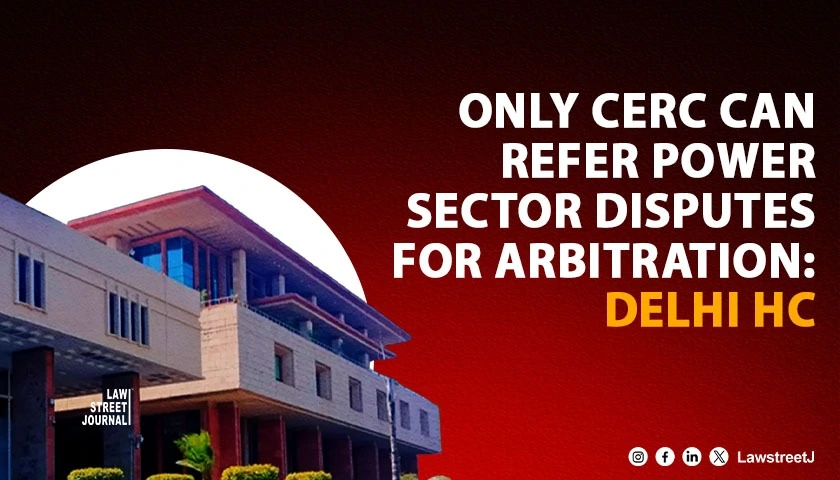New Delhi: The Delhi High Court has held that disputes involving generating companies or transmission licensees under the Electricity Act, 2003, fall exclusively within the jurisdiction of the Central Electricity Regulatory Commission (CERC) and cannot be entertained under Section 9 of the Arbitration and Conciliation Act, 1996.
Justice Purushaindra Kumar Kaurav, while deciding a petition filed by ReNew Wind Energy (AP2) Pvt. Ltd., observed that the referral and adjudicatory powers conferred upon the CERC under Section 79(1)(f) of the Electricity Act override the general provisions of the Arbitration Act. The Court underscored that once a special law provides a specific forum for dispute resolution, that mechanism must be strictly adhered to.
The Court ruled that “when Parliament enacts a complete statutory code with its own adjudicatory and referral mechanism, invocation of a general law like the Arbitration Act stands excluded to that extent.”
The petitioner, ReNew Wind Energy (AP2) Pvt. Ltd., a generating company within the meaning of Section 2(28) of the Electricity Act, operates a 300 MW wind energy project in Kutch, Gujarat. The respondent, Solar Energy Corporation of India (SECI), acts as a Renewable Energy Implementing Agency (REIA) under the Ministry of New and Renewable Energy.
The parties had executed a Power Purchase Agreement (PPA) dated 23.05.2018 for the supply of power for 25 years. On 02.05.2025, SECI issued a notice alleging a shortfall in generation and demanded compensation under Article 4.4.1 of the PPA, threatening deduction of the same from the petitioner’s monthly invoices. The petitioner claimed that the shortfall was caused by force majeure events and, apprehending coercive recovery, approached the Court under Section 9 of the Arbitration Act seeking interim restraint on the deductions.
The respondent, through Senior Advocate M.G. Ramachandran, objected to the maintainability of the petition, contending that only the CERC has jurisdiction to adjudicate or refer such disputes for arbitration under Section 79(1)(f) of the Electricity Act. It was argued that the Electricity Act, being a special statute, overrides the general provisions of the Arbitration Act in view of Sections 174 and 175 of the Act.
On the other hand, Senior Advocate Jayant Mehta, appearing for the petitioner, argued that the dispute was contractual and unrelated to tariff determination or regulatory matters. He contended that the existence of an arbitration clause in the PPA entitled the parties to invoke arbitration under the Arbitration Act and that Section 158 of the Electricity Act applies only when the Act itself mandates arbitration.
After examining the legislative scheme of the Electricity Act alongside the Arbitration Act, the Court concluded that the powers under Section 79(1)(f)—both adjudicatory and referential—are exclusive to the CERC. It held that no court or authority other than the CERC can refer disputes involving generating companies or transmission licensees to arbitration.
The Court further noted that the Electricity Act constitutes a self-contained code governing disputes in the power sector. It observed that “the referral powers of the CERC under Section 79(1)(f), when read with Section 158, provide a special statutory route to arbitration which necessarily prevails over the general mechanism contained in the Arbitration Act.”
The Court relied upon the Supreme Court’s decision in Gujarat Urja Vikas Nigam Ltd. v. Essar Power Ltd., (2008) 4 SCC 755, and the Delhi High Court’s earlier rulings in Coastal Andhra Power Ltd. v. Andhra Pradesh Central Power Distribution Co. Ltd., 2012 SCC OnLine Del 3352, and PTC India Ltd. v. Jaiprakash Ventures Ltd., (2012) 130 DRJ 351, to reiterate that only the Commission, and not civil courts, can determine whether a power-sector dispute is to be adjudicated or referred for arbitration.
Accordingly, the Court dismissed the petition under Section 9 of the Arbitration and Conciliation Act as not maintainable, directing the petitioner to approach the CERC for appropriate relief.
Case Name: ReNew Wind Energy (AP2) Pvt. Ltd. v. Solar Energy Corporation of India
Case No.: O.M.P.(I)(COMM.) 213/2025
Coram: Justice Purushaindra Kumar Kaurav
Date of Decision: 03.11.2025
For the Petitioner: Sr. Adv. Jayant Mehta with Mr. Vishrov Mukherjee and seven other advocates
For the Respondent: Sr. Adv. M.G. Ramachandran with five other advocates



![Delhi High Court Sets Aside Arbitral Tribunal's Award Against NHAI in Highway Project Delay Case [Read Judgment]](/secure/uploads/2023/07/lj_9605_23374c2e-392c-4491-a2fe-f2f12fc5272f.jpg)
![Delhi Court Rejects Stay Request in Defamation Case Against Rajasthan CM Ashok Gehlot [Read Order]](/secure/uploads/2023/08/lj_5208_80de1ddc-d76a-4f7f-b180-408e3ae14fb4.jpg)







